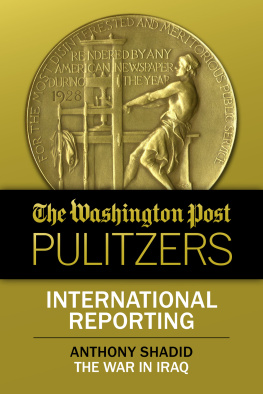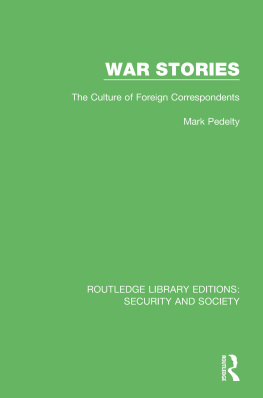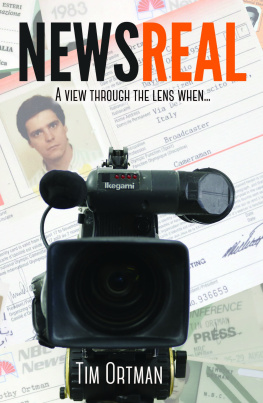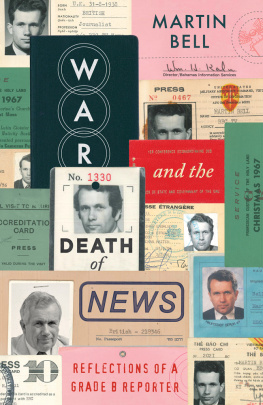NEWS FROM ABROAD
NEWS FROM ABROAD
DONALD R. SHANOR
COLUMBIA UNIVERSITY PRESS

NEW YORK
Columbia University Press
Publishers Since 1893
New York Chichester, West Sussex
cup.columbia.edu
Copyright 2003 Donald R. Shanor
All rights reserved
E-ISBN 978-0-231-52943-3
Library of Congress Cataloging-in-Publication Data
Shanor, Donald R.
p. cm.
Includes bibliographical references and index.
ISBN 0231122403 (cloth : alk. paper)
1. Foreign newsUnited States. I. Title
PN4888.F69S53 2003
070.4332dc21
2002041602
A Columbia University Press E-book.
CUP would be pleased to hear about your reading experience with this e-book at .
For Constance, Elizabeth, Rebecca, and Zo
CONTENTS
The American media are caught between profit and performance. Protected by the Constitution, anointed with the role of a Fourth Estate that monitors the other three branches of government, the nations newspapers and broadcast outlets are also beholden to their shareholders and other owners in an era when 20 percent profits are considered only as a bar to be raised.
These dual duties were difficult enough to perform in the ordinary conditions of the nations life. But since the terrorist attacks of September 11, 2001, and the mobilization of the nation to respond to them, the media have had to accept an additional burden.
It centers on news from abroad. Most of the media neglected the issues and affairs outside Americas borders in the decade between the celebrations at the end of the cold war and the frightful beginning of the war on terror. Most made up for the neglect in the days and months that followed by abandoning some of their less pressing pursuits like Hollywood and courtroom dramas to deal with the ideas, causes, and tactics of the terror movements threatening the United States.
This book is about the medias response to the challenges of reporting on the United States and the world, both before and after the attacks on New York and Washington thrust journalists into the role of national informant, explainer, and consoler. It is also about the conflicts inherent in the medias other role as money earner.
With many thousands of centers of news, producing papers, magazines, radio, television, and Internet information, no single judgment can be applied to the medias performance before or after September 11. Many journalists and organizations have won praise and prizes; others have been criticized for their shortcomings. ABC, one of the leaders of American journalism, managed to take both positions on the issue of what kinds of programs the public would get to watch, expressing pride in its news division and then undermining it by trying to replace Nightline, its best program, in the hope of earning more money from comedy.
Financial considerations also have left most newspapers less able to serve their readers needs of comprehensive coverage and analysis of the new situation in the world. Automation has saved newspapers as much as 25 percent of their salary costs, but in most cases, the money hasnt been spent on hiring extra editors or reporters or expanding the scope of coverage and inquiry. Instead, editorial staff has had to undertake production duties, leaving less time to work on stories, develop sources, and do the job of backgrounding and explaining.
Local television has done far less, although its profits, particularly in larger markets, are generally higher, with 50 percent returns not unusual. Most stations rely on the reduced staffs of the local newspapers to get leads for their coverage, and most ignore subjects of any complexity. Although a range of outside services are available, foreign news is a rarity. Many of the nations radio stations are run virtually on automatic pilot, with little or no news of any kind to interrupt the flow of music and commercials.
Not everyone in the executive suites of the media groups agrees that profits should come before all else. The nation is fortunate that most of its leading newspapers have managed both financial and journalistic success. Its in the thousands of newsrooms in smaller cities, whether local radio and television or hometown newspaper, that cost cutting over the years has limited broader coverage of public affairs news, including foreign news.
Three powerful forcestechnology, immigration, and globalizationare beginning to make their presence felt in the media world, complicating the issue of whether quality or earnings should prevail. In only a decade, the World Wide Web has become the main source of information for millions of Americans, particularly younger people and particularly about international affairs. The surge of Latino and Asian immigration is changing the focus of many media toward more coverage of the regions from which the new Americans come. Global businesses putting down roots across America, along with the arrival of immigrant doctors, refugees, scholars, and manual workers, has made news from abroad local news in Houston; Miami; Anniston, Alabama; and many other cities.
A fourth force, more powerful than the others, is the people who provide the news. All these efforts to serve the public betterand to continue earning moneyare based on the ideas, innovation, and energy of individualsfrom the executive producers and editors who put together the hourly patterns of the worlds news, to the correspondents who supply their ingredients, to the managers who figure out how to pay the bills.
In addition to the many working journalists in newsrooms across the nation and abroad who chose not to have their comments, critical and uncritical, attached to their names, Im grateful to the following people and institutions for their help with the book. None can be held responsible for its imperfections, content, or findings, which remain solely my responsibility. They are Elie Abel, Jonnet Abeles, Jim and Carlotta Anderson, Maribel Bahia, Al and Phyllis Balk, Kate and Jerry Baum, Frances Chastain, Charles and Sarah East, Bill Eaton, Susan Eaton, Lisa Eckelbecker, Osborne Elliott, Jan Ellis, Milt Freudenheim, Marshall Ganz, Norman and Barbara Gelb, Robert Greenberger, James Halbe, Stephen Hess, James Hoge, Ben and Sarah Hyatt, Tara Joseph, Katy Katama, Joan Komner, Robert and Christine Korengold, Alice and Bill Marsh, James McCartney, Robert and Muriel McCord, Phyllis Meras, Robert Merry, Charles and Laurana Mitchelmore, Joan Mowrer, Dagmar Mussey, David Newsom, Charles Novitz, Ralph and Jan Otwell, Sy Pearlman, Deborah Potter, S. C. Quiddick, Larry Radway, Ethel Leith Ross, Steve Ross, John Schidlovsky, and Xu Chengshi. The support of the Cabot Foundation and the U.S. Institute of Peace helped in the initial research for the book; Columbia Universitys Graduate School of Journalism and School of International and Public Affairs provided resources and advice. The libraries at Columbia University, Brown University; and Edgartown, Oak Bluffs, and Vineyard Haven, Massachusetts, as well as the Library of Congress and the Boston Public Library, were valuable sources of research materials. Thanks also are due to these institutions: the American Press Institute, the American Society of Newspaper Editors, the Associated Press Managing Editors, the Freedom Forum, the International Center for Journalists, the Medill School of Journalism of Northwestern University, Motel 6, The Nieman Foundation, the Pew Foundation, the Poynter Institute, the Project for Excellence in Journalism, the Radio and Television News Directors Foundation, the Shelter-Kit of Tilton, N.H. Special thanks go to W. Phillips Davison, Frederick T. C. Yu, and Wallace Irwin, my coauthors and editor for the first News from Abroad, published in 1980 by the Foreign Policy Association. Extra special thanks go to my wife, Constance C. Shanor, for her support, ideas, criticism, and editing.







 NEW YORK
NEW YORK
